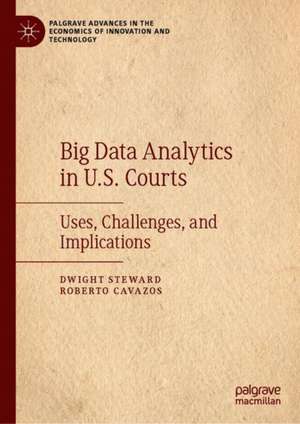Big Data Analytics in U.S. Courts: Uses, Challenges, and Implications: Palgrave Advances in the Economics of Innovation and Technology
Autor Dwight Steward, Roberto Cavazosen Limba Engleză Hardback – 27 noi 2019
Preț: 415.02 lei
Nou
Puncte Express: 623
Preț estimativ în valută:
79.42€ • 86.24$ • 66.72£
79.42€ • 86.24$ • 66.72£
Carte tipărită la comandă
Livrare economică 22 aprilie-06 mai
Preluare comenzi: 021 569.72.76
Specificații
ISBN-13: 9783030317799
ISBN-10: 303031779X
Pagini: 86
Ilustrații: VII, 86 p.
Dimensiuni: 148 x 210 mm
Greutate: 0.27 kg
Ediția:1st ed. 2019
Editura: Springer International Publishing
Colecția Palgrave Pivot
Seria Palgrave Advances in the Economics of Innovation and Technology
Locul publicării:Cham, Switzerland
ISBN-10: 303031779X
Pagini: 86
Ilustrații: VII, 86 p.
Dimensiuni: 148 x 210 mm
Greutate: 0.27 kg
Ediția:1st ed. 2019
Editura: Springer International Publishing
Colecția Palgrave Pivot
Seria Palgrave Advances in the Economics of Innovation and Technology
Locul publicării:Cham, Switzerland
Cuprins
1. Data Analytics and Litigation.- 2. History of Data Analysis in US Courts.- 3. Examples of Litigation Involving Big Data Analytics.- 4. The Courts as Gatekeeper of Big Data Evidence.- 5. Indirect Use of Big Data Analytics in US Courts.- 6. Future Challenges and Recommendations.
Notă biografică
Dwight Steward is Principal Economist at EmployStats, an economic and statistics consulting firm in Texas, USA. He has a PhD in Economics from the University of Iowa. Steward has provided expert witness testimony on economic and statistical analysis of Big Data in courts across the U.S. for over 20 years, and has also been a Senior Lecturer in the Economics and Finance departments at the University of Texas at Austin and the College of Business at Sam Houston State University.
Roberto Cavazos is Executive in Residence of the University of Baltimore Merrick School of Business Department of Decision Science and Information Systems in Maryland, USA. He holds a PhD in Political Economy from the University of Texas. He has worked as a researcher and consultant to governments, corporations and non-profits for over 20 years. He has been on the faculty of Florida International University and Carnegie Mellon University. Hiswork has been published in numerous academic journals and cited in media outlets such as Ad Age, CNBC, CBS News and others.
Roberto Cavazos is Executive in Residence of the University of Baltimore Merrick School of Business Department of Decision Science and Information Systems in Maryland, USA. He holds a PhD in Political Economy from the University of Texas. He has worked as a researcher and consultant to governments, corporations and non-profits for over 20 years. He has been on the faculty of Florida International University and Carnegie Mellon University. Hiswork has been published in numerous academic journals and cited in media outlets such as Ad Age, CNBC, CBS News and others.
Textul de pe ultima copertă
This Palgrave Pivot identifies the key legal, economic, and policy issues surrounding the allowance to use and interpret electronic data consistently and in a scientifically valid manner in U.S. courts. Evidence based on the analysis of large amounts of electronic data ("Big Data") plays an increasing role in civil court disputes, providing information that could not have been obtained from a witness stand. While Big Data evidence presents opportunities, it also presents legal and public policy challenges and concerns. How can one be sure that deviations found in Big Data fall outside the norm? If statistical analyses can be conducted and presented different ways, how can judges and juries make sense of conflicting interpretations? When does Big Data extraction stop being investigative and instead become an invasion of privacy? This book traces the history of Big Data use in U.S. courts, couples current case studies with legal challenges to explore key controversies, and suggests how courts can change the way they handle Big Data to ensure that findings are statistically significant and scientifically sound.
Caracteristici
Examines the use and evolution of Big Data as legal evidence Discusses the differing treatment of Big Data in different U.S. courts and areas of law Looks at inherent and key contradictions between Big Data science principles and Big Data practice






